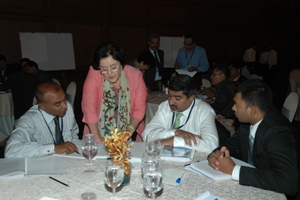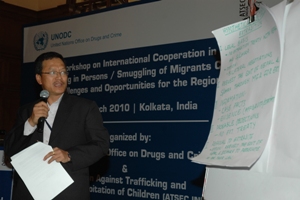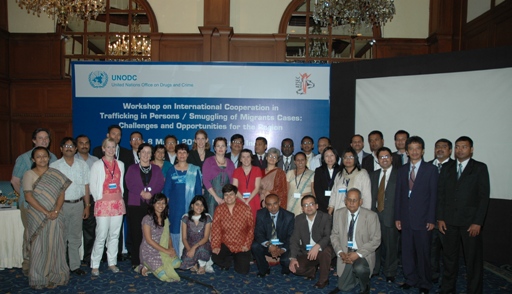South Asia: six countries meet to increase international cooperation against human trafficking and smuggling of migrants
Human trafficking and migrant smuggling are two of the most serious forms of transnational organized crime. It is estimated that in South Asia alone some 150,000 persons are trafficked every year. Although there are no similar estimates for migrant smuggling, countries in the region consider it an issue of increasing concern either as source, transit or destination country.
Since 2003, the world counts with a powerful instrument, the United Nations Convention on Transnational Organized Crime, which includes specific protocols on how to prevent and control human trafficking and migrant smuggling. The Convention and its protocols provide universally accepted definitions of what "transnational organized crime", "trafficking in human beings" and "smuggling of migrants" mean, and define measures that Governments should take to address these forms of organized crime comprehensively from penalization as a serious crime, prosecution, protection of the victims and prevention. With regard to the prosecution of these crimes, international cooperation measures such as extradition, mutual legal assistance and confiscation of assets are of special importance.

In this context, the United Nations Office on Drugs and Crime in association with ATSEC India (Action Against Trafficking and Sexual Exploitation of Children) a network of NGOs working on prevention of human trafficking organized for the first time in South Asia a three-day regional workshop on "International Cooperation in Trafficking in Persons/Smuggling of Migrants Cases" in Kolkata, India from 6 to 8 March 2010.
The workshop brought together 27 officers and representatives from the executive and the judiciary power from Bangladesh, Bhutan, India, Maldives, Nepal and Sri Lanka, including police officers, prosecutors, judges and senior government officials, representatives from the International Justice Mission, International Organization for Migration (IOM), UNIFEM, ATSEC and UNODC experts in legal and criminal justice matters.
During the three-day deliberations, it became clear that the low numbers of convictions of human traffickers and migrant smugglers across the world contrast sharply with the high numbers of trafficking survivors or victims suggesting that efforts undertaken so far have been limited, a fact that also holds true for South Asian countries. Also, not all of the countries have international cooperation mechanisms in place that allow to expedite mutual legal assistance requests or extraditions. In view of this, all participants agreed that human trafficking and migrant smuggling need to be effectively addressed through increased coordinated and concerted efforts by the national Governments and criminal justice machinery working together across borders.
In view of the existing gaps and needs, participating countries and UNODC agreed on the following recommendations:
 •UNODC to provide assistance to ratify and implement UNTOC and its protocols as required
•UNODC to provide assistance to ratify and implement UNTOC and its protocols as required
• UNODC to work with Member States to ensure that criminal justice practitioners, including law enforcement, prosecution and the judiciary, are adequately trained in all matters relating to international cooperation
• Mapping of crime trends, creation of national data bases and exchange of inter-state information on regular basis
• Promoting regional cooperation on repatriation of victims of trafficking and smuggling of migrants by involving the state as well as the civil society institutions
All participants agreed that the workshop was a first, important step in this direction and that the long-term commitment of all parties to international cooperation was required to end impunity in cases of human trafficking and migrant smuggling.
![]()
This Workshop was made possible through funding received from the European Union.
Learn more about the UNODC legal tools to facilitate international cooperation in criminal matters
